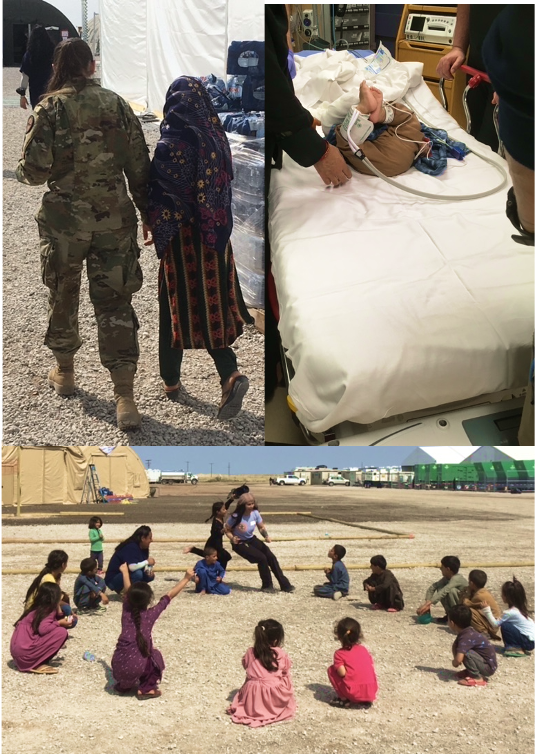By Nellie Bly
Prologue: This was written over the course of several deployment periods of one to three weeks. Aman Omid Village on Holloman Air Force Base closed at the end of January 2022, having in-processed and placed 16,000 Afghani evacuees. All but eight survived. For the five months it existed, and adjusting for average population, the Village death rate was about one-third that of the general U.S. population.
Afghani women are, for the most part, extremely modest and they rarely ventured out. They were essentially treated as chattel property and were not expected or typically allowed to act or speak for themselves. They were never alone in public. It was almost impossible, even with a competent interpreter, to elicit a useful health history. The socioeconomic status of the men seemed more varied, and they spent a lot of time outside.
Prepubescent children seemed to be regarded as disposable. Even tiny ones wandered unsupervised, with few Afghani adults paying any interest to their safety or welfare. On my first day, enormous amounts of materiel and supplies were moved using high-lift all-terrain forklifts, and we saw several near-misses, with toddlers nearly crushed. Later, all vehicle movement in the village required a walking escort to ensure a clear path.
Peri-pubescent girls were considered targets for unbridled male sexuality and were carefully escorted by relatives. There were very few post-adolescent boys of 15-20 years or so; once able to bear arms, they had been recruited into the Taliban or killed.
We had FBI, U.S. Marshals, and State Department special agents. There were Taliban among these people. A major concern was the steady disappearance of the 30-inch metal bars that supported the cots.
We were steadily busy. Three nights ago, we had five calls in 22 minutes and had to split every EMS team. One was an obstetric patient with a high-risk, third-trimester miscarriage, and two were collapsed women in different areas of the crowded dining hall. Each of the collapsed young women spawned a wave of hysteria that yielded more collapsed young women. One was actually sick, and the others were psychological conversion reactions. In some cultures, being sick and acting sick are not readily distinguishable.
On another recent tour of duty, we were called out after midnight to a patrol ATV rollover, the second such inexplicable accident in this flat environment. We had four patients, young airmen, one with a few inches of his left humerus protruding sideways out of his upper arm. He kept asking, “Do you think it’s broken?” Until another paramedic asked, “Was it like that before?” Shock manifests in funny ways. We decided to rename the ATVs as STVs, for “Some Terrain Vehicles.”
Essentially, the majority of the EMS mission was on the women’s shoulders, and men were their support staff. Our women provided the majority of the patient bedside work, as most of our patients were pregnant women or children transported in the arms of their mothers.
Our women were also the ones tasked with the burden of providing and modeling female self-actualization in a culture and population that had never seen strong independent women. The Afghani men tried to pretend the women paramedics weren’t real, or tried not to get caught staring at them. The Afghani women treated our women with a strange combination of deference and scorn. The children couldn’t stop touching them, and seemed to regard them as superheroes.
This particular gig was hard, even for very experienced providers. The person on the stretcher was our priority, but in Afghani culture, the patient may be merely a “useless” woman, failing at her baby-making, son-producing role, or worse, a child, evidently not really regarded as human until puberty.
For the most part, our paramedics were extensively experienced helicopter rescue/critical care providers. Everyone seemed to need to talk and adjust to the challenges of balancing care delivery that was culturally competent with Western norms of child advocacy and egalitarianism. Some can’t handle it and quit. Some never got the chance or flamed out.
On my first day, during in-processing for clearance onto the base, my expected partner was denied entry. One was escorted away by military police after something popped up on deep background. One was arrested for aggravated DUI, for driving the wrong way on the highway; he was on his way from the off-duty crew house in Alamogordo to report for duty here.
This was a terrifying, rewarding, challenging, extraordinary, inspiring, and agonizing type of EMS. Nearly all of it involved the kinds of patients and calls we dread: very sick children and high-risk, pre-term impending deliveries with multiple prior pregnancies, poor prior outcomes, and no prenatal care, compounded by linguistic and cultural barriers that inhibited nuanced understanding and care management.
At good moments, it was like getting paid to camp with cool people, many of them actual old friends. And we had a nearly nonstop F-16 Fighting Falcon air show in our yard.
This will likely be the last thing I do in EMS. It seems like a good way to wrap it up.

